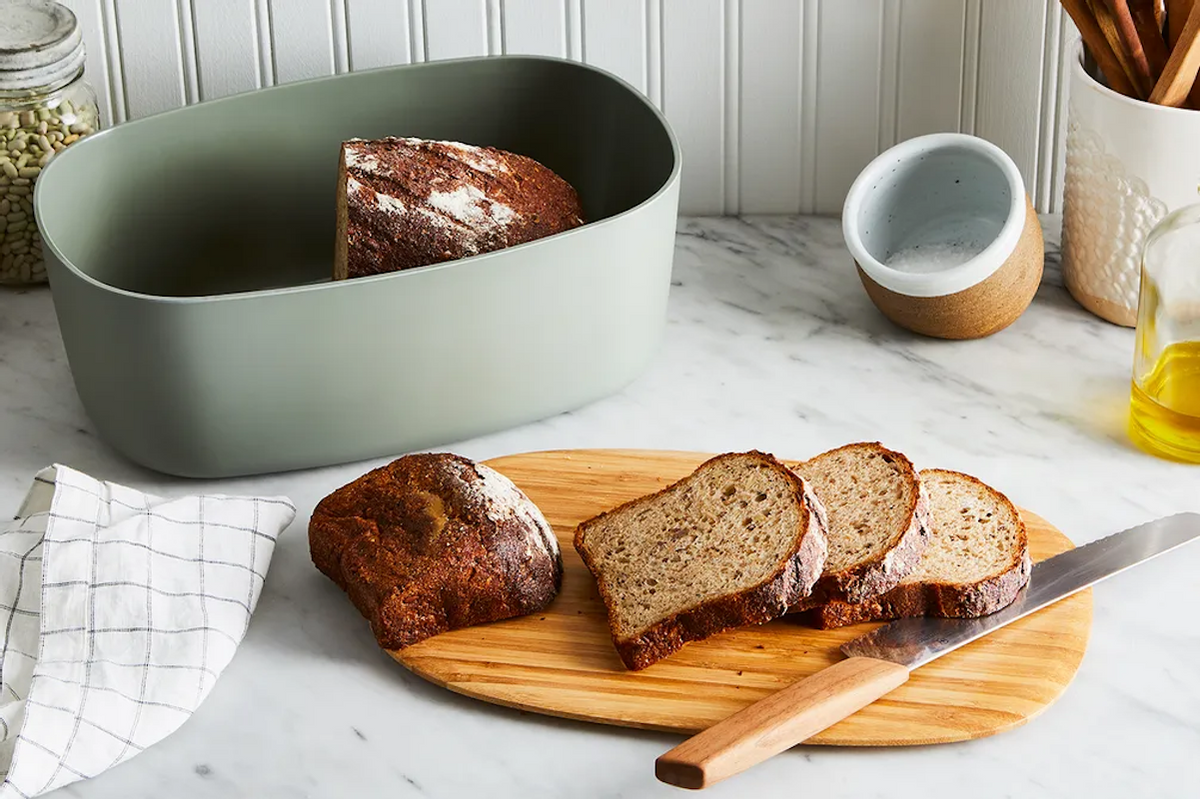There's not much that compares to fresh-baked bread. Well, except for a loaf that you baked yourself. If you've never baked bread before, I heartily suggest that you give it a shot. It's easy, you don't need that much equipment, and you wind up with something delicious.
But a word of caution? You may enjoy it so much that you end up quitting your day job and bake bread all the time . . . which is what happened to me — and I'm certainly not complaining.
Here's What You'll Need To Bake Bread:
1. Fresh whole-grain flour
First things first: You can't make good bread without good flour. You can use white flour, but to make the most delicious and nutritious loaf, you gotta go whole. And whole-wheat flour is just the tip of the iceberg. Flours made of rye, spelt, einkorn, emmer — the possibilities are endless. Regardless of which whole-grain flour you choose, the more recently the flour was milled the better, as flavor and nutritional value decrease with time. Do keep in mind that whole-grain flour will need more water and will ferment faster than white flour.
2. Sourdough starter
A combination of wild yeast and bacteria, sourdough starter can create the most scrumptious breads around. Wild yeast (like the commercial kind) makes the bread rise, and the bacteria produces various acids that help the bread taste wonderful and stay fresh longer. Also, a starter is extremely easy to cultivate — just mix together some flour and water, and just leave it alone. Sounds too good to be true, right? It's not, but it is needy. You need to give your starter some love and maintain it every day for the first two weeks. Otherwise, it may not grow to be strong and good for making bread. I like to use whole-grain rye flour for making starters because I've had good luck with keeping them alive.
More: On maintaining a sourdough starter.
In the olden days, bakers would mix their dough in wooden troughs. These days, many bakers use glass bowls so you can monitor the dough's rising activity and really hone in on your perfect loaf over time.
Just like a chef is helpless in the kitchen without a chef's knife, a baker is helpless in the bakery without a bench knife or a dough scraper. OK, maybe that's an exaggeration, but it's still a super useful tool when it comes to making bread. You can use it to divide dough after bulk fermentation, to pre-shape your loaves, and any time you need to scrape dough off the table. It'll soon become an extension of your hand. I've also been known to use mine to cut up apples during our daily apple break.
More: Take inspo from Josey and make some apple butter for your fresh bread.
Fermentation is greatly affected by temperature, so keeping close track of the temperature of your room, the water you mix into your dough, and the dough itself is very helpful. Instead of eyeballing when you think your loaf is done in the oven, try a good food thermometer instead. We love the Thermapen from ThermoWorks for its accuracy, speed, and durability — everyone's fave Internet grandmother has had hers for a decade!
6. A food scale
Unlike cooking, baking is more of a science with exact measurements and measuring by weight gives you the most accuracy. When you measure dry ingredients like flour by volume, you can actually end up with drastically different amounts of ingredients. Depending on your technique, 1 cup of flour can weigh as little as 100 grams or as much as 175 grams whereas 100 grams of flour is 100 grams of flour no matter how you scoop it.
More: How to check the accuracy of your kitchen scale.
7. Proofing basket
After you've shaped your dough into its final shape, you have to give it a nice, cozy spot to relax and mature so that it's ready to be baked. Some proofing baskets are lined with linen, others are not — what you go with is really a personal preference.
8. Loaf pan
While not what most people think of when they think of "artisan bread," loaf pans are a very useful form for your bread — not to mention that using a pan gives support to grains that form a weaker dough, such as einkorn and rye.
More: Use your loaf pan to make a versatile, chewy, nutty whole-wheat loaf.
9. Razor blade or paring knife
Right before you load your loaf into the oven, you need to score the top so it can puff to its full potential. The slash will make for a beautifully finished loaf, while also providing a variety of textures that wouldn't otherwise come to be without your handiwork. A double-edged razors works well but be careful with the edges and make sure it's out of reach for young ones. If you're clumsy, attach it to a wooden coffee stirrer. Otherwise, any knife you have like a paring knife works just as well.
10. A bread knife
I don't mean to stop you from tearing into that hot loaf with your bare hands, but having a good bread knife is probably a better idea.
More: Go forth and bake bread. Here are 12 yeasted breads you can conquer.
This post contains products independently chosen (and loved) by Food52 editors and writers. Food52 earns an affiliate commission on qualifying purchases of the products we link to.




Shares